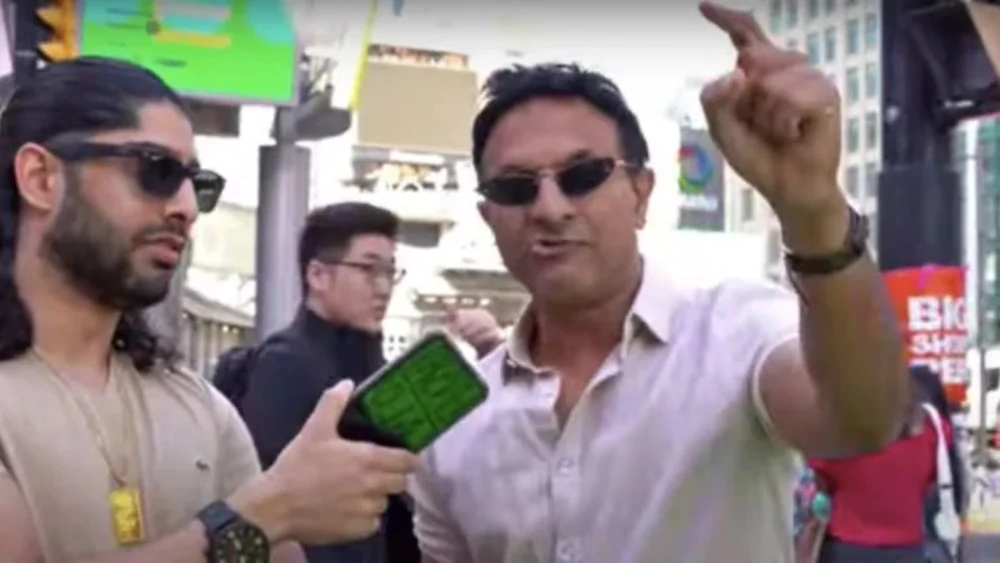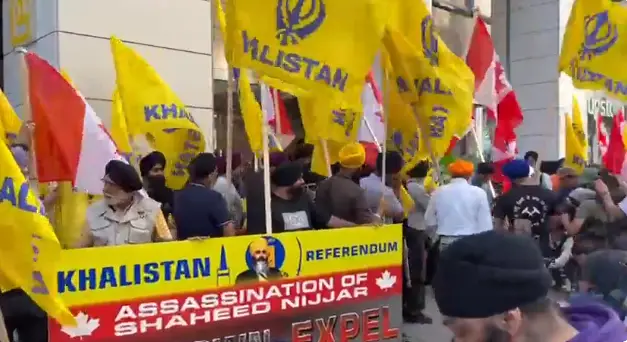“You can’t keep snakes in your backyard and expect them only to bite your neighbours. You know, eventually, those snakes are going to turn on whoever has them in the backyard.”
Hillary Rodham Clinton
The BJP’s successive electoral victories in 2014 and 2019 undoubtedly underscored its ascendancy on the national stage, gradually propelling the RSS from the fringes to the mainstream of Indian and Hindu society. Alongside its domestic gains, the BJP has also sought to extend its influence globally, especially within the Indian diaspora, through entities like the Overseas Friends of BJP (OFBJP), among other strategies. This outreach has various implications.
Community Mobilisation
The BJP’s outreach might facilitate a more significant mobilisation within the Indian diaspora, fostering a sense of collective identity or affiliation towards the political ideology the BJP and RSS propagated. By organising events, discussions, and campaigns, such groups can create a robust network of like-minded individuals abroad.
Political Lobbying
If swayed by the BJP’s narrative, the diaspora could act as a significant lobbying force in their respective countries, potentially influencing foreign policy decisions favouring India or the BJP’s policies.
This can lead to an enhanced global standing and advocacy for India’s position on various international issues.
Financial Support
The diaspora may contribute financially to the BJP and its affiliated organisations, enabling the party to consolidate its resources and further its domestic political agenda.
Information Dissemination
The OFBJP and similar entities can act as channels for disseminating the BJP’s perspective and policies to the global audience, shaping the narrative surrounding key issues.
Counter Narratives and Dissent
The global outreach may also engender counter-narratives and dissent among diaspora groups who may oppose the BJP’s ideologies or policies.
This can manifest in protests, alternative community mobilisations, or public discourse that challenges the BJP’s narrative.
Impact on Social Cohesion
The political outreach may exacerbate communal or ideological divides within the Indian diaspora, potentially impacting social cohesion.
Such divides may mirror India’s political and social cleavages, potentially leading to tension or conflicts within diaspora communities.
Identity and Representation
There may be concerns over representation, as the BJP’s ideology and narrative might not resonate with or reflect the diverse viewpoints and identities within the diaspora. This might raise questions concerning who speaks for the diaspora and whose interests are being served.
Image Projection
The BJP’s outreach might contribute to projecting a particular image of India abroad, possibly overshadowing other narratives or understating the complexities and diversity inherent within Indian society. Through its global outreach, the BJP is extending its influence and navigating the intricate dynamics of diaspora politics. The extent to which this outreach aligns or clashes with the diaspora’s varied interests and ideologies will significantly influence the BJP’s success in galvanising support or facing resistance on the global stage.

Implications – Hindutva and Sikhism
Prof. Bawa Singh, the former deputy chairman of the National Commission for Minorities, critically analyses Sikh politics. He suggests that the RSS and BJP harbour anti-minority sentiments, aiming to diminish Sikhism’s unique identity by merging it with Hinduism or framing Sikh historical struggles as anti-Muslim endeavours. This stance is seen as an attempt to drive a wedge between Sikhs and Muslims, especially notable in Punjab, where solidarity was observed during the enactment of the Citizenship Amendment Act in 2019. Additionally, efforts have been made by the BJP to incorporate Sikh figures, like Manjinder Singh Sirsa and Prof. Sarchand Singh, into their fold to extend their influence in Punjab. Despite promises made to address Sikh concerns, actions like justice for the 1984 massacre victims remain unattended to. During speeches, PM Modi is observed to align Sikh sacrifices and traditions with his nationalist rhetoric, which, according to Singh, misconstrues Sikh history and philosophy.
Gurpreet Singh, a Canadian journalist of Punjabi descent, comments on attempts by the Modi government to court overseas Sikhs to improve its international image. He criticises self-proclaimed Sikh leaders who align with the government’s narrative, compromising the community’s interests. Instances like the disallowance of journalist Rana Ayyub to speak at a gurdwara under Indian government pressure in 2017 contrast starkly with Modi’s warm welcome at the same venue in 2015. Singh also revisits historical antagonisms between the BJP, RSS, and the Sikh community, citing events like the Punjab Suba movement, Operation Blue Star, and the 1984 Sikh massacre.

Grievances are shared by Sikh farmers in Gujarat, who feel threatened by land seizure legislation introduced during Modi’s tenure as Chief Minister. There is a general resentment for derogatory remarks and defamation from BJP and RSS figures towards Sikhs, with many seeing the alleged concern for Sikhs by Modi as mere political posturing.
Singh underscores that the enduring perception of the BJP and RSS appears to negate the distinctiveness and autonomy of Sikhism, treating it as a subset of Hinduism, which is viewed as an attempt to obscure the historical and ongoing tensions between these political entities and the Sikh community.
Societal Divide in the Indian Population in Canada
Understanding the nature and impact of such societal divides requires a nuanced and context-specific analysis.
Pros
Community Mobilisation
Different groups within the Indian diaspora may mobilise to address issues relevant to their community. This mobilisation can foster a sense of belonging and support among members.
Awareness and Advocacy
The discussions and debates arising from societal divides can raise awareness about different political, social, or cultural issues among Indian-origin populations and the broader Canadian society.
Diversity of Opinions
Having a variety of perspectives can enrich the community’s discourse and allow for a broader understanding of issues faced by the diaspora.
Political Engagement
Divides may encourage more individuals to engage in political or social activism, fostering a more active and informed diaspora community.
Cons
Community Fragmentation
Societal divides can lead to fragmentation within the community, potentially causing tension or conflicts among different groups.
Misrepresentation
There’s a risk that the loudest or most organised groups may come to be seen as representing the entire Indian diaspora, which can lead to misrepresentation and oversimplification of the community’s diverse opinions.
Discrimination and Prejudice
The activities of extremist or highly partisan groups may foster or exacerbate discrimination, prejudice, or xenophobia, both within the diaspora and in the broader society.
Negative Stereotyping
High-profile controversies or conflicts can contribute to negative stereotyping of the Indian-origin community in Canada.
Integration Challenges
Deep societal divides may pose challenges for integration into the broader Canadian society as they could perpetuate an ‘us versus them’ narrative.
External Influence
There may be concerns regarding external political influence within the diaspora, possibly undermining its independence or the neutrality of its institutions.
Dilution of Common Goals
Societal divides can dilute or overshadow common goals or issues faced by the Indian-origin community in Canada, hindering collective action.
It is evident that while the OFBJP is active in driving its agenda, the same is being opposed by the other Indian minorities, now being interpreted as an anti-Indian agenda by the BJP/RSS supporters in India and the Western Hemisphere.
The killing of the secessionists in Canada could well be the handiwork of the rivalries being played out by the representatives of the larger Indian population from mainland India in the small towns of Canada.
Prime Minister Justin Trudeau wrongly read the tea leaves to gain political brownie points and blamed the Indian government. Canada’s law and order problem has wrongly been made an international issue and created bad blood amongst all the allies working together to contain the Chinese / Russian hegemony.
By picking sides with China, Justin Trudeau reflected his immaturity and lack of understanding of Canada’s national interests. History and the Canadian voters will reflect on the acts of omission and commission and will be justified in consigning him to history without any credits to his lineage.
